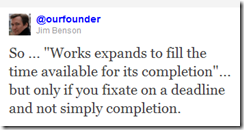Parkinson’s law is:
“Work expands to as to fill the time available for its completion.”
And people misconstrue it all the time.Logic plays funny tricks on our brains sometime. People somehow believe that Parkinson’s Law warns us that work will expand (or contract) to fill the time to the deadline. So if I give you a project that will take you two weeks to do, and give you an eight week deadline, you will not complete it for eight weeks.That might be true. But it is also true that if I give you eight weeks’ work and a two-week deadline, you will complete it in two weeks.You’ll just do a really crappy job.The eight week deadline, on the other hand, gives me the option of prioritizing other work first until I need to get to your project.So, the problem here is not the gaseous nature of work – it’s that deadlines themselves are a major element for prioritization.In other words, work is a game and a major goal of the game is to get work done on-time.Sounds good.But … what if there was a different kind of game of work? What if the game of work was to continuously improve the quality and rate of delivery of your work? The game becomes ways to discover how you can work most effectively, most innovatively. The game stops being how close to an arbitrary deadline can you complete something.Then some interesting things happen.First, work becomes more predictable. You learn the rate at which you truly complete tasks. You can schedule better, promise better. You can complete better.Second, the creation of value becomes more realistically defined. Before, we considered the elements of work to be whatever was included in the contract we were satisfying. When we focus on quality, we find that tasks like making our workspace comfortable, our tools up-to-date, and our minds rested and ready-to-think are of equal weight. We find that rushing toward deadlines decreases quality and taking a few 5 minute breaks throughout the day increases quality. We find that while we can rush work out, that work tends to come back. We start to question if meeting a deadline and having revision requests come back was ever meeting the deadline to begin with.Third, you learn the real goal of estimating is to promise completion you can deliver with quality. Sometimes that takes longer, sometimes it does not. But the goal is quality, not speed.Fourth, communication with others increases. We quickly learn that working alone is working in peril. Our projects benefit from regular communication with our partners and clients. The more constant the collaboration, the more likely there will be success.Deadlines will always be a reality. We will never escape them. The goal here is not deny the existence or advocate for the abolishment of deadlines. What we want is to remove the stress and focus on the date and transfer that to the work itself. So if something is due on the 31st of December and we get it on the 1st of November, it’s finished when it is finished (November 15th) and does not wait until the deadline.So what Parkinson’s Law is really saying is that when you give people a deadline, that’s what they focus on. The game becomes the deadline. S

